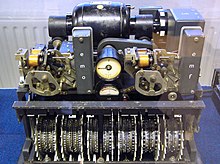What does cryptographer mean?
Definitions for cryptographer
cryp·tog·ra·pher
This dictionary definitions page includes all the possible meanings, example usage and translations of the word cryptographer.
Princeton's WordNet
cryptanalyst, cryptographer, cryptologistnoun
decoder skilled in the analysis of codes and cryptograms
GCIDE
cryptographernoun
one who studies methods for encoding and decoding messages; one who studies cryptography.
Wiktionary
cryptographernoun
A person who is an expert on creating codes and cyphers. Someone who studies cryptology.
Wikipedia
cryptographer
Cryptography, or cryptology (from Ancient Greek: κρυπτός, romanized: kryptós "hidden, secret"; and γράφειν graphein, "to write", or -λογία -logia, "study", respectively), is the practice and study of techniques for secure communication in the presence of adversarial behavior. More generally, cryptography is about constructing and analyzing protocols that prevent third parties or the public from reading private messages. Modern cryptography exists at the intersection of the disciplines of mathematics, computer science, information security, electrical engineering, digital signal processing, physics, and others. Core concepts related to information security (data confidentiality, data integrity, authentication, and non-repudiation) are also central to cryptography. Practical applications of cryptography include electronic commerce, chip-based payment cards, digital currencies, computer passwords, and military communications. Cryptography prior to the modern age was effectively synonymous with encryption, converting readable information (plaintext) to unintelligible nonsense text (ciphertext), which can only be read by reversing the process (decryption). The sender of an encrypted (coded) message shares the decryption (decoding) technique only with intended recipients to preclude access from adversaries. The cryptography literature often uses the names "Alice" (or "A") for the sender, "Bob" (or "B") for the intended recipient, and "Eve" (or "E") for the eavesdropping adversary. Since the development of rotor cipher machines in World War I and the advent of computers in World War II, cryptography methods have become increasingly complex and their applications more varied. Modern cryptography is heavily based on mathematical theory and computer science practice; cryptographic algorithms are designed around computational hardness assumptions, making such algorithms hard to break in actual practice by any adversary. While it is theoretically possible to break into a well-designed system, it is infeasible in actual practice to do so. Such schemes, if well designed, are therefore termed "computationally secure"; theoretical advances (e.g., improvements in integer factorization algorithms) and faster computing technology require these designs to be continually reevaluated, and if necessary, adapted. Information-theoretically secure schemes that provably cannot be broken even with unlimited computing power, such as the one-time pad, are much more difficult to use in practice than the best theoretically breakable, but computationally secure, schemes. The growth of cryptographic technology has raised a number of legal issues in the Information Age. Cryptography's potential for use as a tool for espionage and sedition has led many governments to classify it as a weapon and to limit or even prohibit its use and export. In some jurisdictions where the use of cryptography is legal, laws permit investigators to compel the disclosure of encryption keys for documents relevant to an investigation. Cryptography also plays a major role in digital rights management and copyright infringement disputes in regard to digital media.
ChatGPT
cryptographer
A cryptographer is a professional or expert who specializes in creating and solving codes or cryptographic systems. They focus on developing algorithms, ciphers, and security systems to encrypt sensitive data and protect it from unauthorized access or cyber threats, ensuring secure communication and data privacy. Cryptographers may work in various fields such as information technology, cybersecurity, military services, or government agencies.
Webster Dictionary
Cryptographernoun
one who writes in cipher, or secret characters
Usage in printed sourcesFrom:
- [["1708","1"],["1821","1"],["1876","2"],["1877","2"],["1883","1"],["1889","2"],["1891","1"],["1892","1"],["1893","2"],["1897","2"],["1898","2"],["1900","1"],["1909","1"],["1910","5"],["1914","1"],["1919","2"],["1920","3"],["1921","2"],["1922","15"],["1923","4"],["1924","1"],["1926","3"],["1928","11"],["1929","9"],["1930","7"],["1931","106"],["1932","14"],["1933","1"],["1934","5"],["1935","3"],["1936","16"],["1937","12"],["1938","2"],["1939","45"],["1940","6"],["1941","18"],["1942","7"],["1943","19"],["1944","14"],["1945","1"],["1946","9"],["1947","17"],["1948","25"],["1949","28"],["1950","11"],["1951","15"],["1952","19"],["1953","20"],["1954","40"],["1955","15"],["1956","15"],["1957","30"],["1958","39"],["1959","39"],["1960","20"],["1961","23"],["1962","71"],["1963","49"],["1964","78"],["1965","45"],["1966","64"],["1967","250"],["1968","118"],["1969","57"],["1970","50"],["1971","57"],["1972","51"],["1973","86"],["1974","97"],["1975","125"],["1976","78"],["1977","146"],["1978","120"],["1979","100"],["1980","123"],["1981","155"],["1982","136"],["1983","154"],["1984","157"],["1985","166"],["1986","218"],["1987","226"],["1988","177"],["1989","215"],["1990","219"],["1991","187"],["1992","178"],["1993","270"],["1994","195"],["1995","211"],["1996","261"],["1997","257"],["1998","375"],["1999","386"],["2000","523"],["2001","503"],["2002","613"],["2003","672"],["2004","660"],["2005","563"],["2006","586"],["2007","515"],["2008","384"]]
Numerology
Chaldean Numerology
The numerical value of cryptographer in Chaldean Numerology is: 6
Pythagorean Numerology
The numerical value of cryptographer in Pythagorean Numerology is: 8
Popularity rank by frequency of use
References
Translations for cryptographer
From our Multilingual Translation Dictionary
- người viết mật mãVietnamese
Get even more translations for cryptographer »
Translation
Find a translation for the cryptographer definition in other languages:
Select another language:
- - Select -
- 简体中文 (Chinese - Simplified)
- 繁體中文 (Chinese - Traditional)
- Español (Spanish)
- Esperanto (Esperanto)
- 日本語 (Japanese)
- Português (Portuguese)
- Deutsch (German)
- العربية (Arabic)
- Français (French)
- Русский (Russian)
- ಕನ್ನಡ (Kannada)
- 한국어 (Korean)
- עברית (Hebrew)
- Gaeilge (Irish)
- Українська (Ukrainian)
- اردو (Urdu)
- Magyar (Hungarian)
- मानक हिन्दी (Hindi)
- Indonesia (Indonesian)
- Italiano (Italian)
- தமிழ் (Tamil)
- Türkçe (Turkish)
- తెలుగు (Telugu)
- ภาษาไทย (Thai)
- Tiếng Việt (Vietnamese)
- Čeština (Czech)
- Polski (Polish)
- Bahasa Indonesia (Indonesian)
- Românește (Romanian)
- Nederlands (Dutch)
- Ελληνικά (Greek)
- Latinum (Latin)
- Svenska (Swedish)
- Dansk (Danish)
- Suomi (Finnish)
- فارسی (Persian)
- ייִדיש (Yiddish)
- հայերեն (Armenian)
- Norsk (Norwegian)
- English (English)
Word of the Day
Would you like us to send you a FREE new word definition delivered to your inbox daily?
Citation
Use the citation below to add this definition to your bibliography:
Style:MLAChicagoAPA
"cryptographer." Definitions.net. STANDS4 LLC, 2025. Web. 5 Feb. 2025. <https://www.definitions.net/definition/cryptographer>.







Discuss these cryptographer definitions with the community:
Report Comment
We're doing our best to make sure our content is useful, accurate and safe.
If by any chance you spot an inappropriate comment while navigating through our website please use this form to let us know, and we'll take care of it shortly.
Attachment
You need to be logged in to favorite.
Log In